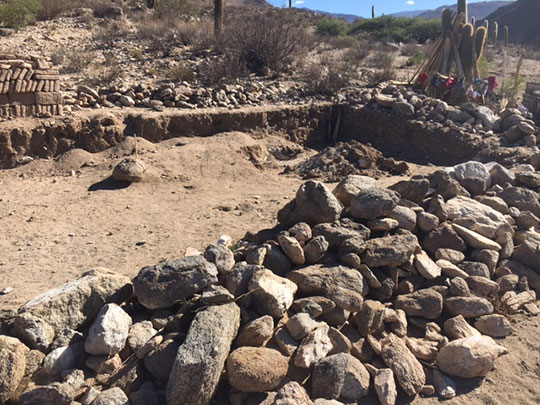SAN MARTIN, ARGENTINA – We spent the night at a hotel in the nearby village of Molinos and then drove back to see the new farm.
We hoped that our spirits might have revived after a good night’s sleep… or maybe some helpful leprechauns had put the place in order.
Nothing of the sort. It was still a pile of rubble.
“Why are we doing this?” Elizabeth wanted to know.
We had no good answer.
Javier, who operates the backhoe, was busy clearing in the new fields.
“How long do you think it will take?” we asked.
“Oh, I don’t know… ‘til I retire, probably…”
Javier laughed heartily. But our plan is to have the fields ready for planting in April.
We’ll plant oats… let them grow over the winter… and then plow them under and plant alfalfa in the spring. (The seasons are reversed; we’re in the southern hemisphere.)
More Trouble Afoot
Meanwhile, back at the ranch… there’s more trouble afoot.
We had heard that the originarios – locals claiming indigenous rights to land in this area – were building a house on our land, after we specifically told them not to.
So, we mounted up… and rode out – unarmed – to check.
Sure enough, excavation was already well advanced. Adobes were piled up. Even the roof beams were waiting.
This is a violation of a court order. But that doesn’t mean they can’t get away with it.
The local courts don’t like to come down too hard on the originarios; it leads to political trouble.
 The originarios begin construction of a house on Bill’s land
The originarios begin construction of a house on Bill’s land
“I’d like to bulldoze that foundation and take away those adobes,” said our lawyer.
“Otherwise, they’re going to keep at it. But that may lead to retaliation. After all, you’ve got a glass room in your house. Isn’t there some expression in English about people who live in glass houses?”
We will go to court again and try to get another order.
Nothing Makes Sense
Back on our beat – money – we have no special insights and no new information.
The stock market goes up… and up… and up.
The Dow, the S&P 500, and the Nasdaq are all making record highs. And global stocks have never been more valuable.
Meanwhile, investor complacency, as measured by Wall Street’s “fear gauge,” the VIX, is at record lows.
Everyone knows stock prices must come down. But no one knows when… or even why.
Here at Capital & Conflict, we try to keep our feet on the ground. But we would need stilts to understand what is going on in today’s markets. Nothing is solid. Nothing is true. Nothing really makes sense.
Companies’ profits are fake. They goose them with accounting tricks.
The government’s statistics are fake, too – unemployment, inflation, GDP. If they were done properly (which our research team is in the process of doing), they would show that at least half the country has been in a depression for the entire 21st century.
Stock prices are fake – driven up by ultra-low interest rates… QE… and share buybacks.
And interest rates themselves are fake – the Fed has pushed them down to a 5,000-year low.
They no longer reflect how much capital (savings) is available relative to the demand for loans… and therefore how much credit should really cost.
And at the bottom of it, the money itself is fake.
Dead-End Project
We’ve gassed so much about this, we won’t bother you with more today.
But money is the tape measure for the carpenter economy.
If the tape stretches or shrinks… you end up with a house you wouldn’t want to live in, with crooked walls and doors askew.
More importantly, you end up with something that will fall on your head.
You understand this as well as we do. The trouble is, we don’t know when this monstrosity will collapse… or how.
And in the meantime…
The plumbers are putting in more and more pipe… the masons are laying up more blocks… the electricians are running cables and conduit all over the place… and the carpenters are making noise with their hammers.
In other words, real resources are going into a woebegone, money-losing, dead-end building project.
How long the hammering will go on, we don’t know. All we can say is that we don’t want to be in it when the earthquake comes.
Regards,
![]()
Bill
Category: Economics

